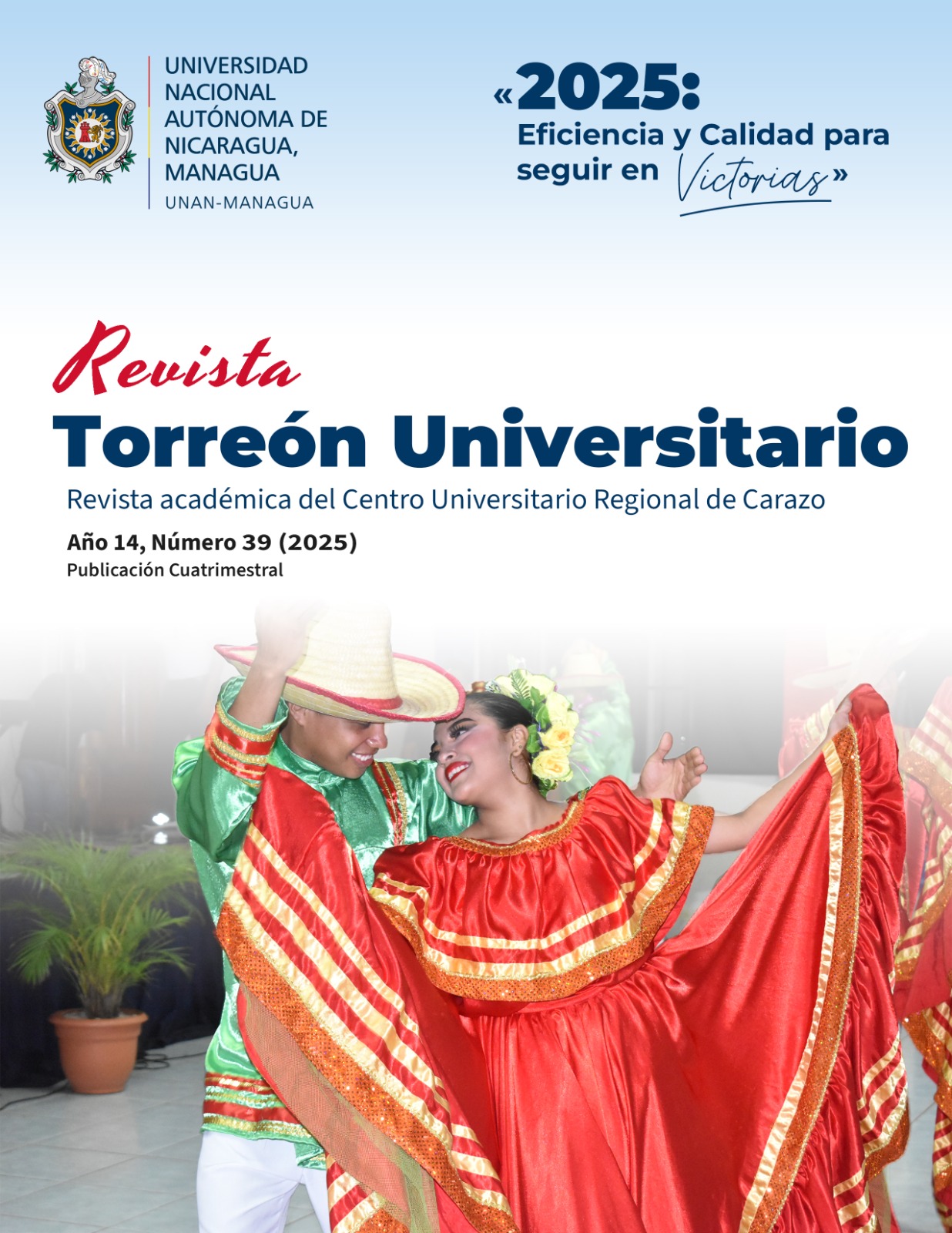Generic competencies and their effect on the professional training of university students
DOI:
https://doi.org/10.5377/rtu.v14i39.20050Keywords:
Generic competencies, elective component, educational technology, students, professional developmentAbstract
The purpose of this article is to determine the level of generic competence (technological and creative) and the effect it has on the professional training of university students. This is a descriptive study with a quantitative approach. A questionnaire was used as a technique and a survey of open and closed questions as an instrument. For the application, the Microsoft Forms 365 tool was used and the link was shared with the informants via WhatsApp. The sample consisted of 37 students enrolled in the Elective component Tools for the Creation of Digital Educational Materials (HCMED) at UNAN, Managua. As part of the main findings, it is highlighted that students achieved significant competence in the use of web tools, the creation of digital materials, the ability to be creative in the design of digital resources, the search for digital information in reliable sites and respect for copyright, seen from the professional ethics. However, it is evident that one of the competencies that needs to be strengthened is the contextualization of information reflected in academic and didactic documents. In addition, it is concluded that the generic competencies (technological and creative) are essential in the student’s professional training to obtain learning results in accordance with the professional profile and, therefore, with the needs of society.
Downloads
References
Batalloso, J. M., & Moraes, M. C. (2020). Contextualización Educativa: diálogo, epistemología y complejidad. Debates Em Educação, 12(28), 576–595. https://doi.org/10.28998/2175-6600.2020v12n28p576-595
Binkley, M., Erstad, O., Herman, J., Raizen, S., Ripley, M., Miller-Ricci, M., & Rumble, M. (2012). Defining Twenty-First Century Skills. In Assessment and Teaching of 21st Century Skills (pp. 17–66). Springer Netherlands. https://doi.org/10.1007/978-94-007-2324-5_2
Boza Carreño, Á., & Conde Vélez, S. (2015). 46 Web 2.0 in higher education: attitude, training, use, impact, challenges and tools of web 2.0. http://greav.ub.edu/der/
Campos Rodríguez, D. (2011). Redalyc.DEFINICIÓN DE COMPETENCIAS INTERNACIONALES: EXPERIENCIA DEL DEPARTAMENTO DE HISTORIA DE LA UNIVERSIDAD NACIONAL DE COLOMBIA EN EL PROYECTO ALFA TUNNING EUROPA - AMÉRICA LATINA. http://www.redalyc.org/articulo.oa?id=477248388005
Casillas Alvarado, M. A., Ramírez Martinel, A., & Ortega Guerrero, J. C. (2016). Afinidad tecnológica de los estudiantes universitarios. Innovación Educativa, 16, 151–175. https://www.redalyc.org/pdf/1794/179445403008.pdf
Castro, S., Guzmán, B., & Casado, D. (2007). Las Tic en los procesos de enseñanza y aprendizaje. Laurus, 13, 213–234. https://www.redalyc.org/pdf/761/76102311.pdf
Crespí, P., & García-Ramos, J. M. (2021). Generic skills at university. Evaluation of a training program. Educacion XX1, 24(1), 1–30. https://doi.org/10.5944/educXX1.26846
Fernández-Pampillón, A. M. (2017). Asómate al mundo Asómate al mundo Asómate al mundo de la Innovación de la Innovación de la Innovación. www.agencia2.com
Gallardo Echenique, E., Marqués Molías, L., & Bullen, M. (2015). El estudiante en la educación superior: Usos académicos y sociales de la tecnología digital. RUSC Universities and Knowledge Society Journal, 12(1), 25–37. https://doi.org/10.7238/rusc.v12i1.2078
González, J., Wagenaar, R., & Beneitone, P. (2004). Tuning-América Latina: un proyecto de las universidades. Revista Iberoamericana de Educación, 35, 151–164. https://doi.org/10.35362/rie350881
Guerrero Muñoz, J. C. (2008). La educación virtual como factor de desarrollo competitivo. Red Internacional de Investigadores En Competitividad. https://www.riico.net/index.php/riico/article/view/1018/379
Hauke, M., & Huelva, L. (2016). Competencias que demandan las empresas en Nicaragua. https://funides.com/wp-content/uploads/2019/09/competencias_que_demandan_las_empresas_en_nicaragua.pdf
Hernández-Sampieri, R., Fernández-Collado, C., & Baptista-Lucio, P. (2014). Alcances de la investigación. México: McGraw-Hill.
Hernández-Sampieri, R., & Mendoza Torres, C. P. (2018). Cap-3-Sampieri-2018.
Mallarino Flórez, C. (2007). La contextualización del currículo: Cognición y no verbalidad. Revista Científica Guillermo de Ockham, 5, 73–87. https://www.redalyc.org/pdf/1053/105316864006.pdf
Obaya, A. V, Vargas R. Yolanda Marina, & Degadillo G. Graciela. (2011). Aspectos relevantes de la educación basada en competencias para la formación profesional / Relevant Aspects of Concepts and Methods of the Competence Outcomes for Higher Education. 22(1), 63–68. https://www.scielo.org.mx/scielo.php?script=sci_arttext&pid=S0187-893X2011000100011
Pérez-Ortega, I. (2017). Creación de Recursos Educativos Digitales: Reflexiones sobre innovación educativa con TIC. International Journal of Sociology of Education, 6(2), 244. https://doi.org/10.17583/rise.2017.2544
Rozo García, H. A. (2016). Desarrollo de la competencia digital en estudiantes universitarios. Opción.
Sandino Castillo, M. V., Espinoza Montenegro Ernesto, & Ruiz Cabrera, R. (2017). Competencias tecnológicas de egresados/graduados universitarios de Nicaragua, Guatemala, Colombia y Argentina. Tecnología, Accesibilidad. Educar En La Sociedad de La Red. http://www.acai-la.org/wp-content/uploads/2017/12/SandinoEspinozaRuizUNANLeon.pdf
Silva-Díaz, F., Carrillo-Rosúa, J., Fernández-Ferrer, G., Marfil-Carmona, R., & Narváez, R. (2023). Valoración de tecnologías inmersivas y enfoque STEM en la formación inicial del profesorado. RIED-Revista Iberoamericana de Educación a Distancia, 27(1), 139–162. https://doi.org/10.5944/ried.27.1.37688
Vicerrectorado de Docencia UNAN Managua. (2020). Diseño curricular para desarrollar competencias en la UNAN Managua.
Villa, A., & Poblete, M. (2007). Aprendizaje basado en competencias. Una propuesta para la evaluación de las competencias genéricas.
Downloads
Published
Issue
Section
License
Copyright (c) 2025 National Autonomous University of Nicaragua, Managua

This work is licensed under a Creative Commons Attribution-NonCommercial-NoDerivatives 4.0 International License.
The authors who publish in this journal agree to the following terms.
- The author or authors of the articles, essays or research grant the National Autonomous University of Nicaragua, Managua (UNAN-Managua) the editing rights (copyright) of the submitted work, therefore the University has the exclusive right to publish the article for the entire copyright period.
- These copyrights/authors authorize Torreón Universitario Magazine and the University to edit and disseminate/publish the article in said Magazine, including printed and electronic reproduction, storage, retrieval and any other type of publication, and sources of secondary information as services. of summaries and databases, they also empower it to protect the article against unauthorized use for dissemination by printed or electronic media (PDF, HTML, EPUB, XML or others).
License for use of content
The magazine uses the Creative Commons Attribution-NonCommercial-NoDerivs 4.0 International License.
Under this statement:

This journal is licensed under a Creative Commons Attribution-NonCommercial-NoDerivatives 4.0 International License. It can be copied, distributed and transmitted publicly as long as the author and source are cited (Revista Torreón Universitario), it should not be modified or used for any commercial purpose. The full license can be found at http://creativecommons.org/licenses/by-nc-nd/4.0/.



